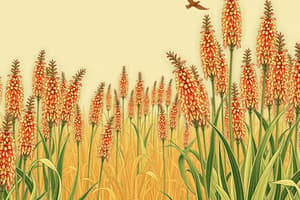Podcast
Questions and Answers
What is the chromosomal configuration for Sorghum?
What is the chromosomal configuration for Sorghum?
- 2n=20, n=10 (correct)
- 2n=25, n=12.5
- 2n=30, n=15
- 2n=22, n=11
Which variety of Sorghum is recognized as drought and salinity tolerant?
Which variety of Sorghum is recognized as drought and salinity tolerant?
- M 35-1
- CSH-1 (correct)
- M 35-2
- Combine kafir -60
What type of germination does Sorghum exhibit?
What type of germination does Sorghum exhibit?
- Epigeal
- Aborescent
- Viviparous
- Hypogeal (correct)
What is the critical temperature for Sorghum growth?
What is the critical temperature for Sorghum growth?
Which soil type is most suitable for Sorghum cultivation?
Which soil type is most suitable for Sorghum cultivation?
What is the significant harmful effect known as Sorghum sickness?
What is the significant harmful effect known as Sorghum sickness?
What is the recommended seed rate for sowing sorghum?
What is the recommended seed rate for sowing sorghum?
Which pathogen causes Downy Mildew in sorghum?
Which pathogen causes Downy Mildew in sorghum?
What is the required amount of nitrogen fertilizer for sorghum cultivation per hectare?
What is the required amount of nitrogen fertilizer for sorghum cultivation per hectare?
At which moisture level should sorghum grains ideally be harvested?
At which moisture level should sorghum grains ideally be harvested?
What is the primary insect pest affecting sorghum that belongs to the genus Contarinia?
What is the primary insect pest affecting sorghum that belongs to the genus Contarinia?
Which of the following is NOT a listed disease affecting sorghum?
Which of the following is NOT a listed disease affecting sorghum?
What is the recommended spacing for sowing sorghum?
What is the recommended spacing for sowing sorghum?
What is the yield range for hybrid sorghum (Grain) per hectare?
What is the yield range for hybrid sorghum (Grain) per hectare?
Flashcards are hidden until you start studying
Study Notes
Sorghum Overview
- Botanical Name: Sorghum bicolor
- Family: Gramineae
- Origin: East Central Africa
- Known as "Camel crop" for drought resistance
- Chromosome number: 2n=20, n=10
Agronomic Practices
- Stubbles decompose slowly due to wide C:N ratio, immobilizing soil nitrogen.
- To mitigate nitrogen blockage, apply 25% more nitrogen for succeeding crops.
Seed Rate, Spacing & Sowing Time
- Seed Rate: 12-15 kg/ha
- Spacing: 30-35 cm
- Planting Depth: 3-4 cm
- Plant Population: Approximately 1,80,000 plants/ha
- Optimal Sowing Time: Late June to early July
Manure & Fertilizer Requirements
- Farmyard Manure (FYM): 10-15 tonnes/ha
- Nitrogen (N): 100 kg/ha
- Phosphorus (P): 50 kg/ha
- Potassium (K): 40 kg/ha
Major Diseases
- Downy Mildew: Peronosclerospora sorghi
- Anthracnose and Red Rot: Colletotrichum graminicolum
- Rust: Puccinia purpurea
- Ergot: Sphacelia sorghi
- Grain Smut: Sphacelotheca sorghi
Major Insects
- Shoot Fly: Atherigona varia soccata
- Sorghum Midge: Contarinia sorghicola
- Shoot Bug: Peregrinus maidis
Harvesting Guidelines
- Ideal harvest stage: Grains hard with moisture below 25%
Yield Potential
- Rainfed Condition: 25-30 quintals/ha
- Fodder: 300-400 quintals/ha
- Hybrid Sorghum (Grain): 40-50 quintals/ha
Toxicity Considerations
- Sorghum leaves possess high levels of Hydrocyanic acid (HCN) during knee stage; risky for animal consumption.
- Grazing sorghum leaves under drought with HCN can be fatal to animals.
High Yield Varieties
- Best Rabi Jowar: M 35-1
- Drought and Salinity Tolerant: CSH-1
- First Hybrid Developed: CSH-1 (1964)
- Important Male Sterile Variety: Combine Kafir-60
Nutritional Content
- Sorghum grain low in Lysine but high in Leucine.
Climate and Soil Requirements
- Prefers warm climates, tolerating high temperatures.
- Total water requirement: 350 mm
- Soils: Clay loam or loam preferred, pH 6.0-8.5.
- Notable Soil Type: Black cotton soil of central India.
Temperature Preferences
- Minimum Growth Temperature: 8-10°C
- Optimum Growth Temperature: 32-35°C
- Maximum Tolerance: 36-38°C
Sorghum Sickness
- Refers to nitrogen unavailability impacting succeeding crops due to sorghum stubbles.
Studying That Suits You
Use AI to generate personalized quizzes and flashcards to suit your learning preferences.




